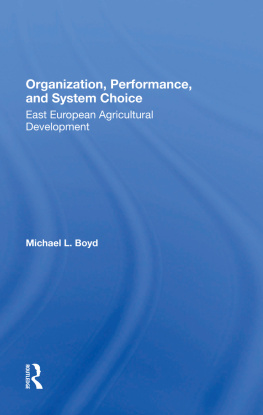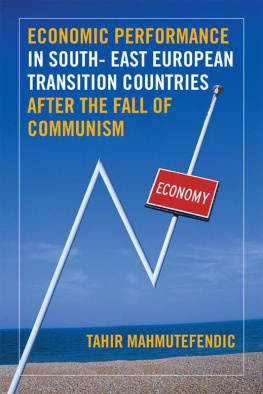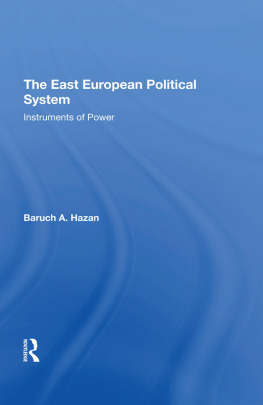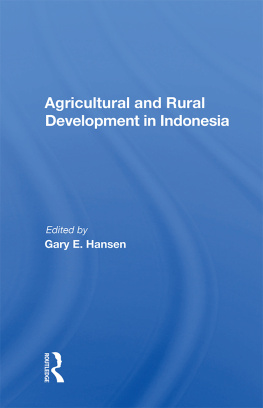Organization, Performance, and System Choice East European Agricultural Development
First published 1991 by Westview Press
Published 2019 by Routledge
52 Vanderbilt Avenue, New York, NY 10017
2 Park Square, Milton Park, Abingdon, Oxon OX14 4RN
Routledge is an imprint of the Taylor & Francis Group, an informa business
Copyright 1991 by Taylor & Francis
All rights reserved. No part of this book may be reprinted or reproduced or utilised in any form or by any electronic, mechanical, or other means, now known or hereafter invented, including photocopying and recording, or in any information storage or retrieval system, without permission in writing from the publishers.
Notice:
Product or corporate names may be trademarks or registered trademarks, and are used only for identification and explanation without intent to infringe.
Library of Congress Cataloging-in-Publication Data
Boyd, Michael L., 1954
Organization, performance, and system choice: East European
agricultural development / by Michael L. Boyd.
p. cm.
Includes bibliographical references and index.
ISBN 0-8133-1130-6
1. AgricultureEconomic aspectsEurope, EasternCase studies.
I. Title.
HD1918.B69 1991
338.1'0947dc20 90-21794
CIP
ISBN 13: 978-0-367-28200-4 (hbk)
When one has worked on a series of projects as long as I have on those that make up this book, one incurs a tremendous debt that can never be appropriately acknowledged. Nevertheless, I would be remiss if I did not make note of at least the largest and most obvious of contributions made by others. The oldest part of the work is the Yugoslav case study, which began as my doctoral dissertation. I received funding from the International Research and Exchanges Board (IREX), which allowed me to spend an all-too-brief but productive five months in Zagreb in 1982. During this time, I was greatly aided by the advice and criticism of Professor Vladimir Stipetic of the University of Zagreb. As I worked on the dissertation, John Pencavel and Evsey Domar taught me much about critical thinking and clear writing, as well as economics. To them I owe a special debt of gratitude for the often difficult task they undertook of simply keeping track of my whereabouts. In addition, the Yugoslav study benefited from the critical contributions of Paul David and members of the development and history seminars at Stanford and the comments of Tim Bates and two anonymous referees and the editor at the Review of Economics and Statistics, where the core material was first published as "The Performance of Private and Cooperative Socialist Organization: Postwar Yugoslav Agriculture," 69, 2 (May 1987): 205-214, copyright 1987 by Elsevier Science Publishers. I would like to thank Elsevier Science Publishers for kind permission to reprint portions of this article in .
The Polish case study was undertaken with the financial support of the University of Vermont through UCRS grant UVM85-2 and the National Council for Soviet and East European Research (NCSEER) under grant #800-20. I must thank especially my mentor from the NCSEER, Paul Marer, for his comments, criticism, and support in that work. In addition, Art Woolf, members of the comparative economics seminar at Indiana University, Karl-Eugen Wadekin, Josef Brada, and two anonymous referees of the Journal of Comparative Economics made significant critical contributions. Some materials in are drawn from "The Performance of Private and Socialist Agriculture in Poland: The Effects of Policy and Organization," Journal of Comparative Economics 12, 1 (March 1988): 61-73, copyright 1988 by Academic Press, Inc., and I thank the publishers for kind permission to reprint them here.
The Bulgarian study was supported by the National Council for Soviet and East European Research under grant #802-07 and by the Social Science Research Council. This work benefited from the critical comments and insights of Ed Hewett, Herb Levine, Gregory Grossman, and the participants in the Social Science Research Council Fourth Annual Workshop on Soviet and East European Economies, as well as, again, Josef Brada and two referees of the Journal of Comparative Economics. Once more I thank the Academic Press for permission to reprint some materials on the Bulgarian case study drawn from "Organizational Reform and Agricultural Performance: The Case of Bulgarian Agriculture, 1960-1985," Journal of Comparative Economics 14, 1 (March 1990): 70-87, copyright 1990 by Academic Press, Inc.
Combining these three case studies into a coherent piece was a rather long and arduous task. In bringing greater clarity to the presentation I was ably assisted by the editorial and production staff at Westview Press, and I would be remiss if I failed to thank all who worked on this project. I would like especially to thank Marykay Scott, Lynn Arts, Diane Hess, and Martha Leggett for their thorough and thoughtful work.
This is only a partial listing of those who contributed materially to improving the work of these projects. To the many whose names do not appear, either because of my faulty memory or simple lack of space, thank you. I want also to thank my students at the University of Vermont. Not only have they listened patiently while many of the broader, contextual ideas found here were presented to them (not always in the clearest fashion at first), but they also provided me with serious, constructive criticism on those ideas (in return for all the red ink I spilled on their papers).
Finally, although I am not sure what use such an acknowledgment can be to her, I also thank my wife, Elaine. Without her support and forbearance, none of this would have come to pass. Her support, both material and spiritual, has been simply beyond measure. Inadequate as such a gesture is, I dedicate this book to her.
Although much that is good in this work is due to the contributions of others, responsibility for all opinions and any errors of fact or interpretation is mine alone (except any I can blame on my son, Isak, or our dog, Tarik).
Michael L. Boyd
ONE
Economic Organization and System Performance: The Options for System Choice
We live in a world dominated by competition among different political, social, and economic systems. Although the actual differences among systems are often blurred by the rhetoric of ideological competition, the various existing systems represent alternative visions of how the world works, or how it ought to work. Because the outcome of this competition affects the lives of everyone, it is extremely important to increase our understanding of the differences among economic (and their accompanying political) systems -- in particular, differences in performance. Current debate about and active pursuit of systemic change in the Soviet Union, Eastern Europe, and China show vividly that these issues are of more than academic interest. In addition, many of the world's developing countries are in a position consciously to choose one or another system. In all of these situations, the need to understand as completely and accurately as possible the comparative characteristics of different economic and related political systems is clear and compelling.
In order to produce informed evaluations of the strengths and weaknesses of different economic systems, it is first necessary to confront a set of complex and confounding questions that center on system definition and description. These questions involve issues that, although familiar, must be carefully considered in order to define clearly both the objects of and the context for comparison. Suitable opportunities for empirical investigation which allow one to assess the relative merits and drawbacks of different types of economic organization can be identified by considering these issues. I make this overly simplified description in order to emphasize that such measuring and comparing must be carried out and evaluated in full recognition of their inherent limitations. Nevertheless, only by conducting such exercises can we accumulate sufficient evidence to reach even tentative conclusions about the controversial and important questions of relative system performance.












